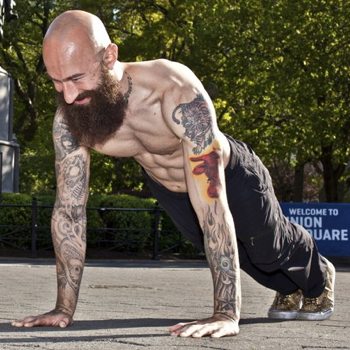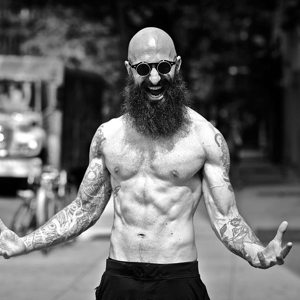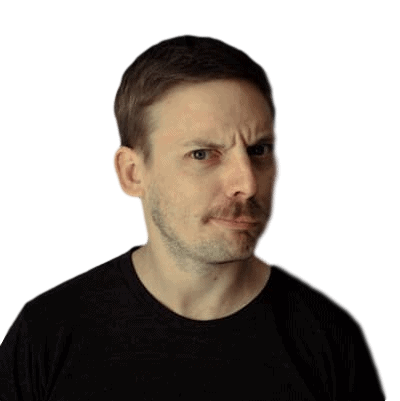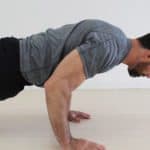 You know that our mission at GMB is teaching you physical confidence through mindful practice.
You know that our mission at GMB is teaching you physical confidence through mindful practice.
Time marches on, we can’t change that. The future creeps up on all of us.
And it might leave you wondering “can I keep the strength I’ve gained?” “Is it possible to not loose those skills I busted my ass to learn?”
On this episode of the GMB Show we’re happy to welcome back our good friend and favorite guest co-host Al Kavadlo. Al joins Ryan to talk about how to develop the mindful practice part of the equation and how to use that mindfulness to truly become future-proof.
Priorities, abilities, and desires will change over time, but what can remain constant is the confidence you’ve built through all that deliberate regular practice.
 Al Kavadlo is one of the world’s leading experts in bodyweight strength training and calisthenics. The author of several books, including the Amazon bestseller Street Workout, Kavadlo is also known for his appearance in the popular Convict Conditioning book series.
Al Kavadlo is one of the world’s leading experts in bodyweight strength training and calisthenics. The author of several books, including the Amazon bestseller Street Workout, Kavadlo is also known for his appearance in the popular Convict Conditioning book series.
Famous for smiling while performing some of the most difficult bodyweight exercises imaginable, Al has racked up millions of views on his YouTube channel.
As lead instructor for the Progressive Calisthenics Certification (PCC), Al gets to bring his unique coaching style to fitness trainers and enthusiasts around the globe. Al has been featured in The New York Times, Men’s Health and The New York Post. He is also a regular contributor to Bodybuilding.com.
You can reach Al on his website, Facebook, and Instagram.
What you’ll hear:
- 4:00: How technology has allowed us to skip planning, and why this matters.
- 8:45: What a positive workout entails, despite injuries or other obstacles.
- 12:00: Where Al sees himself going in the next five to ten years.
- 17:00: How your age can contribute to how you feel about your accomplishments.
- 21:20: The importance of mental training, in addition to physical training.
How To Future-Proof Your Training
Ryan: Al, what’s up my man, how you doing?
Al: Hey, hey, hey, what’s going on?
Ryan: Doing pretty well man, finally Japan’s getting a little warmer, it’s nice. I’m sure New York is heating up.
Al: Today’s actually like the first real hot day we’ve had in New York.
Ryan: Cool man, that means shirt off, right? For you.
Al: I’m slightly less pale than usual, I got a little sun today.
Ryan: Today we were talking this just a little bit before we started recording, but looking at the future … the cool thing I like about you is you can read the future, right? That’s one of your specialties that not many people know about you, it’s in your beard, you keep it in your beard.
Al: That’s the secret, yes.
Ryan: Looking at the future, I think this is a really good topic in that a lot of people will try to play for things in the future, and think about, “Okay from ten years from now.” You know, “Five, ten, fifteen, twenty years from now what am I going to be doing?” I think it’s great to look at where you want to be going, but something that you mention that I totally agree with is you never know what the future’s going to bring. I always like to say, “Hope for the best but prepare for the worst.”
Al: That’s a good motto.
Ryan: It’s little stoic maybe, but again, my big thing is appreciating everything that I have right now. When I wake up, making sure I tell my kids I love them before they go to school, and hug them. Same with my wife, she doesn’t go to school, but before I leave. Making sure you appreciate the things that you have right now even though you plan on being with these people for the rest of your life, you never know.
Al: That’s right.
Ryan: I think this is also similar in our training. Before I get too much into it I’m going to turn it over to you, and just kind of let you roll with what you were going to say earlier before we started recording.
Al: If you had asked me ten years ago, or at the beginning of my personal training career, I’ve been doing this about thirteen years now. “Where do you see yourself in ten years?” I definitely don’t think I would have predicted that I’m writing books, and articles for magazines. Traveling the world doing workshops, teaching people about Calisthenics. At that point I had just started using email recently. There was no Facebook yet, there was no social media, I don’t even think I was texting people so everything was just in person or word of mouth. Just the fact that there was a platform change I couldn’t have possible foreseen, that allowed this whole other thing to take place. I feel like moving forward, trying to make predictions about what’s the future of the fitness industry going to be, or what’s our future as trainers.
There’s going to be game changing things that are going to happen over the course of the next ten or twenty years that are just going to open up new opportunities that we just can’t envision right now. The future is going to be very exciting, but we just gotta try to let it unfold day to day. Like you said, appreciate each day while you got it, make the best of it.
Ryan: Yeah, we were talking earlier about travel. It’s something that you said, “Dude, I’m the same way.” It’s not really stressing the small details that are happening in life, and trying not to. In this regards to travel, for example I’ll be going to the United States here pretty soon. I’ll be hanging out with you, and doing some stuff.
Al: Hey, hey, hey.
Ryan: It’s not like I’m worried right now, trying to figure out, “Okay, once I get to New York at what time am I going to do this? What …” I don’t even know, “What train line do I need to catch to get somewhere?” Things like that. Things have a way of working themselves out, stressing about those little things isn’t really going to help much. Coming back to what you’re saying about the future and not knowing where we’re going. Looking at technology I think too, is pretty amazing in the fact that because we have this technology we are able to kind of step back a bit, and not have to rely on so much of the planning anymore.
This is a horrible thing maybe for me to say, but it’s like I know in Japan if I want to go anywhere and I don’t know how to get there, all I need to do is put it into my GPS in my phone and I’m there. Now, as a boy scout …
Al: You’re conflicted.
Ryan: Right, I am. I’m kind of like, “All right, I want to look at a map, and I want to make sure that I get there.” I think the convenience of having that is actually a good thing. A lot of people have heard me say this before, the internet, I’m not a fan of being online all the time with things like this. Here’s the thing, the internet and the technology allows us to do this right now, and also to help more people in the world. I think that done right, in a way that’s constructive for everyone, I think it’s a good thing.
Al: Everything’s in the dosage right? Too much of anything could become poison.
Ryan: Yeah.
Al: Even a wonderful thing like the internet.
Ryan: Then looking at the future too, it’s what will happen to this technology to allow us to further deepen, basically not just what we’re doing but how we interact with people. I’m kind of rambling a bit but what I’m trying to bring this back to is that to me it all comes down to this interaction with other people. Where do I see myself in the future? Well hopefully being more connected in a positive way to other people to help spread a positive message. I keep bringing it back to this positive thing because unfortunately we do see a lot of negativity. Let’s just be honest, look at all the comments on YouTube that people just feel that they need to post, right?
Al: There’s some people who like us on YouTube also.
Ryan: A couple people, yeah.
Al: I’ve actually lately been getting I think more positive than negative ones.
Ryan: Good.
Al: There’s still haters out there, but I think that the balance has shifted.
Ryan: That’s good. Somebody said to me, “You get a lot of haters, that’s great, that just means that a message is getting out there. You can’t please everybody so just focus on the people that like you.”
Al: You know.
Ryan: Go ahead.
Al: I forgot where I first heard it but I like the idea that when people judge you they’re really telling you about themselves, they’re not saying anything about you. If somebody’s coming at you with hostility or anger, they’re just saying, “I’m an angry, nasty person.” If someone’s coming at you with positivity, you can always find something good to say in any situation, right? That’s the old cliché. You can always find something to criticise of the type of person that’s looking for fault. It’s a reflection of the person.
Ryan: Yeah, no absolutely. That was kind of where I was coming back to that. What is the purpose, and I don’t even want to say purpose, but looking at what you and I are doing. We were talking about this a little earlier and it was like we have this opportunity to reach all these different people out there, we have the technology recently to be able to do it. We have a responsibility you and I, to help basically is what I’m saying. To serve, maybe a better way to look at it.
I think that’s a super cool thing. I never thought either, a boy from Kansas coming to Japan, and ended up doing the stuff that I’m doing, and talking to the famous Al Kavadlo here, it’s a super cool thing and I’m really privileged I think to have this opportunity.
Al: That shows what a good attitude you have, that’s what I was just saying, right? There could be someone in your situation who isn’t such a positive person who would find a lot of things that made them unhappy.
Ryan: Sure.
Al: Just bitch and moan about those things, and try to make other people feel bad, and bring people down with them. I’m amazed at how often successful people can still be really negative. It’s like, wow you’ve been able to be successful even though you’re such a jerk. It happens right? There’s something for everybody.
Ryan: Yeah, always gotta have something to bitch about, right?
Al: Working hard I guess is the most important thing.
Ryan: That’s right.
Al: Not to say, I’m sure you have moments where you have negativity, or you complain, I do too.
Ryan: Oh absolutely.
Al: I just try not to do it publicly. Why spread that out there? Get your dirty laundry out in your private conversations, get it off your chest, and then when you’re being a public person try to put good out there in the world.
Ryan: That’s really good way to say it. We all have that opportunity to do this. Whether we’ve been on Facebook, or Twitter, or what not. Really bringing it back to our workout, and I know this is kind of this discussion …
Al: Yeah, bring it on back to the workout.
Ryan: It’s all over the place, but bringing it back to the workout, it’s just like anything … when you look at a positive workout, and a positive workout to me really is not that you necessarily nailed all those skills that you were after that day.
Al: “You’re the new PR.”
Ryan: Yeah. I think a lot of it is just showing up with the attitude of, “I’m going to start to work, and I’m going to step on the mat and just do the best that I can that day.” Now that day might be, I don’t know, you might be injured. You might be injured, and you might be down and thinking, “Oh man, I’m not going to be able to do what I want.” If you can step into the workout and just say, “I’m going to start, and I’m going to do what I can that day with what I have,” you’ll probably end up having a pretty darn good workout. You’ll be working towards those other things maybe that you didn’t think you needed. Even though you might think that you should be working on your one arm chins but you can’t because you broke your arm, so maybe you work on your …
Al: Stretch your hamstrings, right?
Ryan: Yeah, stretch your hamstrings. It’s coming back and looking at working with what you have at that particular time. The future, that’s what it is to me. It’s not knowing and think that you need to get a particular place. When it comes down to it, you don’t need to do anything. You can sit on the couch, and you can do whatever the hell you want, right?
Al: Free country, U.S. is at least.
Ryan: Right? Well, I don’t know for how much longer but that’s a different topic.
Al: Enjoy it while it lasts.
Ryan: Looking at the future really is you determine right now how you’re going to follow as far as the process goes. I think I can’t tell anybody, “In a years time I’m going to have a one arm handstand on my pinkie finger.” They’ll probably tell you, “That’s not going to happen,” but I can at least, if that …
Al: You’d be the first.
Ryan: I would be the first. I think that’s something that you’re after, that looking at the future what are you doing today in order to help you setup a positive process to allow you to move towards that particular goal? Then things just happen, right? This is something you talk about a lot, right?
Al: Letting the path unfold, right?
Ryan: Yes, yeah.
Al: Taking the right action in the moment, doing each little thing with care and attention, and before you know it an opportunity that maybe you had never even thought was going to be there is there, and you are ready to knock it down because you’ve been doing your diligence.
Ryan: Putting in the work, putting in the work. Coming back to us, a lot of people might see us, especially with all of your books, and all the things that you do, you’re on one hundred percent of the time, right? You never have an off day, right Al? Right?
Al: Sure. Hey, hey, hey. Of course I have off days, I’m just like anybody else. I’m human, and I try to remind people of that, less they put me on pedestal.
Ryan: I’ll always put you up there as long as you can just pull me up too, so that’d be good.
Al: You’re on the podium, you can get there.
Ryan: Coming back to the future, tell me in regards to you, what do you think about? We all have plans, right? We all have plans, and certain dreams that we want to be after. Looking at you, how would you answer the question of, where do you see yourself, your routines, your abilities and what not, in the next five, ten years?
Al: I certainly hope they haven’t declined, but at the very least if I could still do everything I’m doing today, that’s not bad.
Ryan: Yeah.
Al: I kind of feel like at this point in my training, it’s not really so much about getting stronger anymore. Not to say that I’ve tapped into a hundred percent of my strength potential because I’m sure I haven’t, but I’m more interested in just unlocking new skills, improving technique, refining these little details. You know like you always say, coming into each practice with resect for it, and appreciation that you get to do it. I always say, “Training isn’t something you have to do, it’s something you get to do. It’s a blessing.” If I’m still able to move as well or maybe even better in five or ten years, well that would be a wonderful thing. If I’m not, then I’m going to try to get up every morning and do whatever I can to feel good.
Ryan: What about gains man?
Al: I want to add two inches to my biceps also, I gotta have that.
Ryan: You gotta have that. Nah man, all joking aside, I totally agree with you. As we do get older this is something that your priorities change a bit. For some people not just a bit, but a lot. I mean having kids … I mean, you have two kids, right? Little fur kids.
Al: The fur babies.
Ryan: The fur babies.
Al: They’re not quite as much work as the fleshy ones.
Ryan: Yeah.
Al: The little doggies definitely require a lot of maintenance. They’re a good halfway point between being a parent and not being a parent.
Ryan: I agree you with there man, I agree with you. Looking at your life, and as you get older and realizing that you don’t make sacrifices necessarily and give up, it’s more that you see things in a different light. This is, in my case, I’m forty three right now. If I look ten years ago, I was pretty hardcore full on. I was still hitting it so hard, of course that was right towards the end of my Judo days when I was competing a lot, and just thinking that I just had to smash everybody on the mat.
I think as I get older, to me really, you brought up this too. It’s more like maintenance in the sense of like strength wise, and making sure that I’m not losing what I already have, but actually exploring more, and seeing what I can do and go beyond. It’s not necessarily that I’m trying to get new skills per say, it’s more refining the skills that I have and seeing how much better and more efficient I can make them. Example, yesterday I was actually working, and this was something I posted to Instagram is doing like a … so straddle press to handstand and lower down to planche.
Al: I saw that, it looks very good by the way, I was impressed.
Ryan: Thank you sir, thank you.
Al: I felt bad about myself because I can’t do a …
Ryan: Oh man, I’ll take you down.
Al: I’m kidding, I didn’t feel bad about myself.
Ryan: I’ll talk you down.
Al: I was impressed.
Ryan: You bring up a good thing, and it’s tough because we post these things, and … this is the dilemma that I’ve always had, and I’m kind of going off on a tangent, pardon me for saying this. I’ve never been one to show off. This is actually something that Andy and Jarlo were like, “Dude you gotta be showing more of your stuff, what you can really do, and what not.” I’ve never been the kind of person who’s been like, “Hey look at me, check out what I can do.” I still have a really hard time with that. I’ve had to change my mindset to be like, “Okay, I’m simply showing this stuff to show what is possible with diligent training, at this age, and hopefully inspire other people to work on whatever they want to work on.”
For example there’s plans that I’m working on, a lot of people might say, “Oh my goodness, the form is a little bit off here. My goodness …” I have no idea. “Your toes weren’t pointed.”
Al: “You’re doing it wrong.”
Ryan: Yeah, “You’re doing it wrong,” or what not. Ten years ago, even five years ago I probably would have been like, “Oh, I’ve got to get it so perfect.”
Al: Right, rough on that.
Ryan: Priorities for me are very different right now. I just try and enjoy where I am that day, and just explore, and train to get it better. The planche thing is, if I don’t hold a ten second planche I’m actually perfectly fine with myself, I don’t feel that I’m a bad person. That I need to spend a hundred more hours working to achieve two more seconds on my planche’s. If you’re out there and that is something that you really want to focus on, good. Go ahead and do that. I’ll do everything I can to help you, and Al will do the same to help you achieve what you want to achieve. Figure out what’s right for you at that point in your life, and then enjoy the shit out of it. That’s really what I’m trying to do right now. Before I go too much into it you were going to say something.
Al: I was just to say about getting older, the older you get the more impressive everything you can do becomes. If you can hold the planche even for just a few seconds in your forties, I mean forget about it.
Ryan: That’s a good point man.
Al: Once you’re fifty and sixty, if you’re still doing it it’s just going to be that much more impressive as you get older. Actually just saw a statistic today that the median age in the U.S. is 36.8. that’s almost exactly my age right now. I know, it’s younger than you thought it would be, right?
Ryan: Yes.
Al: Younger than I thought it would be too, I guess there’s a lot of people having babies. I’m exactly the median age right now, and it was kind of a weird thought because I don’t feel like I’m on the cusp of being old, but I guess that was kind of the realization like, “Wow, soon I’m going to be on the other side, I’ll be an old person. These are the older, these are the younger people.” Then I had the thought like, “Whoa, that’s great because once you’re old,” like I just said, “Everything is that much more impressive. “Wow, that old guy can do a muscle up? That’s really cool.”
Ryan: It’s interesting, one of my trainers, a GMB trainer, his name is Steven Stern, the guy is amazing. He’s such an inspiration to me. He’s like sixty five, almost sixty six and just the stuff he does. I mean it’s just, it’s great. What the cool thing about it is, is the way he looks at things. It’s not that he’s trying to compete with the young kids, and trying to do all this other stuff. He just focuses on what he’s doing, and what he wants to do. The impressive thing about that is, because of that, because of the way that he’s doing it, because of his attitude towards his training he’s not doing stupid stuff that’s going to force him to move towards an injury or what not, and he keeps getting better which is really super cool.
That’s what I want to be like. I don’t have any big plans for when I’m fifty, sixty, all I want to do is, for one still be alive, and I want to still …
Al: That’s the first part.
Ryan: Yeah, that’s the first thing. Sometimes I wonder, I’m kind of like, “Oh jeez.”
Al: Stay above ground, number one.
Ryan: Stay above ground and keep moving, that’s basically it.
Al: That’s number two.
Ryan: Sounds like a zombie movie or something. I think that when we’re younger we’ve got these big plans and ambitions, and I think that’s very good. I think it’s good to have those, something to work towards. I’m not saying that I’ve achieved everything in my life that I want, but I just want to keep moving forward, and that forward momentum of course is going to be different every single day regarding what I want to do. I think that as long as I have people like you, and people like Mike Fitch, and other people that inspire me, and I can learn from, I think that I will be able to continue improving in the sense of being able to keep moving and not die. I think that’s maybe what it all comes down to, for me at least.
Al: I think you guys drive home really well on a point that I try to make to people, is workouts aren’t supposed to break you down, they’re supposed to build you up. I think some people are under this impression that I train like five hours a day, and I’m super, super hardcore like that. It’s really not true. I don’t train like a professional athlete, I train like a regular person who works a lot and also makes time for exercise. My work happens to be fitness related, but working out isn’t my job, helping other people work out is my job. I spent a lot of time doing that, that I’m not physically active during.
Ryan: That’s so, you nailed it because it’s the same thing. Sometimes I’ll get a message like, “You’re so lucky because you get to train all day long.” I’m like, seriously? You really think that? Wow, today I was only able to squeeze a workout in. Yeah, I do set aside time to workout and I know you do too.
Al: Of course, it’s a priority. Anyone who’s making it a priority is going to set aside time, no matter how busy they are.
Ryan: All day long, and yes I am, I guess training in a sense that the training is not necessarily the physical grind. This is also something else that a lot of people miss, and this is something that you talk about a lot in your books and everything that you do, is that mental side of things as well. Not just in the physical realm of you continuing to improve through the ages, I want to also actively incorporate my mental training, and hopefully become a little more intelligent. I’m still trying, it’s going to take awhile, but I’m still trying. Learning …
Al: Gain some knowledge.
Ryan: Gain some knowledge.
Al: If you can’t get smarter, you could at least get more knowledge.
Ryan: That’s right, more knowledge. The kind of knowledge that is going to help me to help other people. I guess that’s also where things have changed a bit. Maybe you’re the same way. It’s like when I’m reading your books, and especially your new book … by the way, want to give a shout out for your new book? What’s your new book there Al?
Al: Yeah, the new book, we’re really excited about it. It’s a collaboration between me and my brother Danny, and it’s our first official collaboration. We’ve both done books about Calisthenics before, but neither of us have ever done, or been involved with anything of this magnitude. I did a book a few years ago called, “Raising the Bar, the defendant of God to pull up bar calisthenics.”
Ryan: Great book.
Al: Thank you. The impetus for that was I had been a pull up enthusiast for a long time, and was starting to get more into advanced variations, and different progressions, and all these other things you would do on the pull up bar. It dawned on me that there wasn’t really a pull up book out there. There were a lot of books at the time about different kinds of weight training, maybe general calisthenics but nothing that was really focused on the bar. One of those examples of just kind of wanting to, “Well it’s not there, I want it to be out there, so I’m going to just kind of make it happen myself.” I put that book together, and in the years since I’ve refined some of my teachings, I’ve learned some new stuff, I’ve seen some new stuff, and Danny and I put this book together. We kind of had the similar realization that there wasn’t really an official street workout book. There was a lot of people doing this kind of training, a lot of people becoming more interested in this kind of training.
Where Raising the Bar was just focused on the pull up bar, this one now, it’s a full body book using anything and everything that you might encounter.
Ryan: Nice.
Al: The other thing about this book that’s very exciting for me, it’s very personal because there’s a lot of photos in this book. Photos that we gathered over the last few years, we’ve done a lot of traveling. We always make sure we get some calisthenics in whatever city we’re visiting, get some photos. It’s kind of, in addition to having a lot of information, a lot of workouts, and a lot of exercises, it’s got a lot of really cool and unique photos too. We’re really excited for people not just to get the information, but to kind of see our journey, and see all the places we’ve been, and the things we’ve done.
Unlike you Ryan we do like to show off, me and Danny. We’ve not had a problem with that. You can’t always get smarter, but you can try to gain more knowledge. I think that’s an important thing as we continue on this journey, is just staying open minded and being able to change our ideas, and acquire new information that may make us reevaluate things and hopefully learn from them and improve.
Ryan: Yeah I agree with you man, that is really, really good looking at it that way. As we go through the ages of learning, looking back at our experiences, and learning from those in order to just try to continue to get better. Whether that be physically, mentally, or whatever.
All right man I think we’re going to end it there today. As always, thank you so much for being on here. We’re going to pick up the discussion in another chat with Al in a little bit. Everybody, as always, thanks for listening, it’s always a pleasure man.
Al: Thanks very much.
Be sure to catch the next episode by subscribing to the GMB Show:



